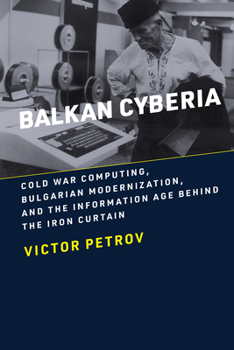Balkan Cyberia: Cold War Computing, Bulgarian Modernization, and the Information Age Behind the Iron Curtain
Bulgaria in 1963 was a communist country led by a centralized party trying to navigate a multinational Cold War. The state needed money, and it sought prestige. By cultivating a burgeoning computer industry, Bulgaria achieved both but at great cost to the established order. In Balkan Cyberia, Victor Petrov elevates a deeply researched, local story of ambition into an essential history of global innovation, ideological conflict, and exchange. Granted tremendous freedom by the Politburo and backed by a concerted state secret intelligence effort, a new privileged class of technical intellectuals and managers rose to prominence in Bulgaria in the 1960s. Plugged in to transnational business and professional networks, they strove to realize the party's radical dreams of utopian automation, and Bulgaria would come to manufacture up to half of the Eastern Bloc's electronics. Yet, as Petrov shows, the export-oriented nature of the industry also led to the disruption of party rule. Technicians, now thinking with and through computers, began to recast the dominant intellectual discourse within a framework of reform, while technocratic managers translated their newfound political clout into economic power that served them well before and after the revolutions of 1989.
Format:Paperback
Language:English
ISBN:0262545128
ISBN13:9780262545129
Release Date:June 2023
Publisher:MIT Press
Length:424 Pages
Weight:1.14 lbs.
Dimensions:1.2" x 5.9" x 8.8"
Customer Reviews
0 rating





